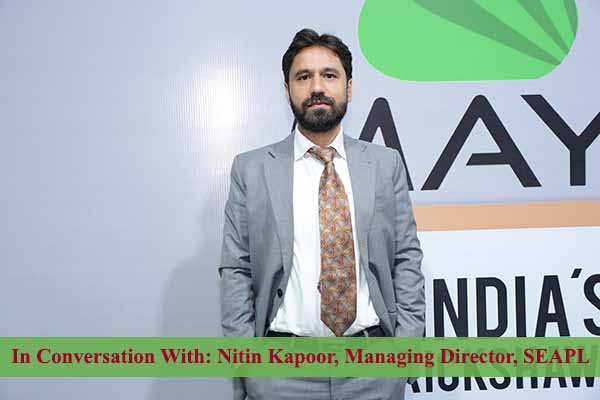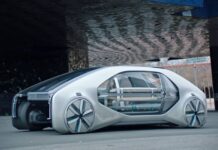Saera Electric Auto Pvt. Ltd.(SEAPL)was the first company to introduce the e-rickshaw in India and the first to receive ICAT (Vehicle Approval Certificate) from the International Centre for Automotive Technology, Manesar. The signature brand of SEAPL is Mayuri, popular for e-rickshaw and e-cart. The company also manufactures YOGO, the renowned 2W brand. TimesTech spoke with Nitin Kapoor, Managing Director of Saera Electric Auto Private Limited to know more about SEAPL, challenges in transitioning to electric mobility and much more.
Read the full interview here:
TimesTech: Tell us about Saera Electric Auto and the work it has been doing.
Nitin: Commenced in the year 2011, Saera Electric Auto Private Limited (SEAPL) is one of the leading companies in the electric vehicle sector. The primary operation of Saera is manufacturing cleaner and greener electric vehicles (e-rickshaw and e-cart loader) and electric 2W low-speed vehicles. Founded by the father of the e-rickshaw, Vijay Kapoor, SEAPL was the first company to introduce the e-rickshaw in India and the first to receive ICAT (Vehicle Approval Certificate) from the International Centre for Automotive Technology, Manesar.
Saera Electric Auto is the subsidiary of the reputed Satra Group of Companies, which has a diversified business portfolio in domains like automobile spare parts, electric vehicles and agriculture equipment. The signature brand of SEAPL is Mayuri, popular for e-rickshaw and e-cart. The company also manufactures YOGO, the renowned 2W brand.
Currently, Saera has two state-of-the-art plants. The first one is in Bhiwadi (Rajasthan), which has a production capacity of 24000 units. The second plant is in Bawal (Haryana) which was earlier the Harley Davidson Plant in India and has been taken over by us and has a production capacity of 2 lakh units of electric two-wheelers and 36,000 units of three-wheelers in a year. Also, additional capacity has been set up with a new plant in Kosi (UP), which will further enhance the production capacity by 24000 units per year. All electric vehicles manufactured by SEAPL are designed and assembled using cutting-edge technology prevalent in the industry.
The company registered a year-on-year growth of 205 per cent, to reach 1460 million in FY 2021-22 from 477.4 million in FY 2020-21; thereby maintaining its position as one of the top companies pan India in the electric three-wheeler segment.
TimesTech: What are the challenges in India’s transition from fossil fuels to EVs?
Nitin: India has set an ambitious target of completely replacing fossil fuel vehicles with electric vehicles (EVs) by 2030. Currently, there are about 1.33 million electric vehicles, with more than half of them being e-rickshaws. In 2019, only 0.8% of total vehicle registrations were electric. The same year, the GOI approved Phase II of the FAME India Scheme, (Faster Adoption and Manufacture of Hybrid and Electric Vehicles), an incentive programme for the promotion of electric vehicles in the country. The goal of the second phase aimed to generate demand for electric vehicles, specifically 7,000 buses, 500,000 three-wheelers, 55,000 passenger cars (including hybrids) and 1 million two-wheel electric vehicles over a three-year period ending in 2022.
The major challenges India is facing with the transition from vehicles powered by conventional sources of energy like fossil fuels to cleaner and greener electric vehicles are price anxiety, inadequate charging infrastructure, a wide gap between EV and ICE vehicle prices, and a lack of assurance about satisfactory resale value, etc. Among these, the biggest concern that India should address is creating a robust and large-scale EV charging infrastructure. Despite increasing demands for electric vehicles, presently there are less than 2000 public charging stations in India with a concentration in a few states. However, India is likely to add around 48,000 additional electric vehicle chargers over the next few months. Also, there is a scarcity of battery technology. Currently, India is entirely dependent on imports of lithium-ion batteries which eventually increase the price of the final product.
TimesTech: How IoT and App enabled e-vehicles/e-rickshaw will play a role in boosting Digital India Schemes?
Nitin: The rising fuel prices and India’s commitment to meet the sustainable development goals set in the Paris agreement have triggered the surge of electric vehicles on Indian roads. The electric vehicle ecosystem in the country has also been evolving in price mechanisms, business models, the building of a charging station infrastructure according to industry standards, availability, and the designing of critical components, etc. However, there are still certain challenges on both the technical front and the supply chain. IoT devices or telematics play a major role in addressing the various complexities as they can dig into the root cause of most uncertainties by providing real-time information. There has also been a steady flow of investments from fintech players in IoT-enabled vehicles, which is creating an integrated EV platform. The new-age technology also enables real-time monitoring of vehicles, equipment and other assets; thereby facilitating predictive and preventive maintenance.
TimesTech: What are Saera Electric’s plans moving forward?
Nitin: SEAPL will soon be launching high-speed Passenger and Cargo L 5 vehicles. We are awaiting ICAT approval and the production plan will be launched as soon as the approvals are received from approving authorities.
SEAPL will also launch Electric Golf Cart, which is expected to be launched in the coming months, within this FY 22-23.
SEAPL has signed up contract manufacturing arrangement with LML Electric, under this tie-up; SEAPL will manufacture vehicles for LML as per the specs and processes of LML in their Bawal Plant which has a production capacity of 2 lakh E2W in a year. We are also in talks with other Electric OEM companies for similar manufacturing agreements, the discussions are in the final stages and confirmation will be shared shortly.















